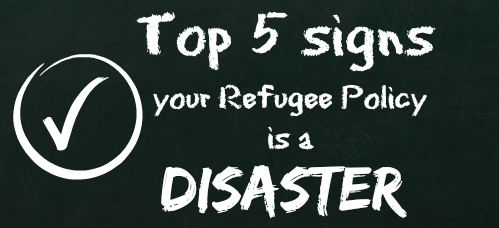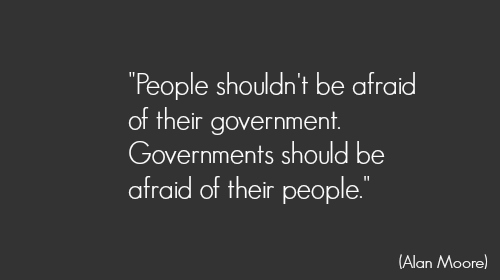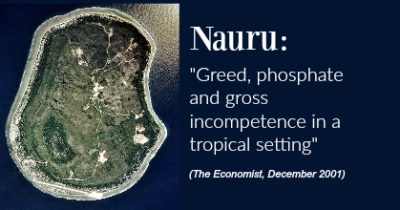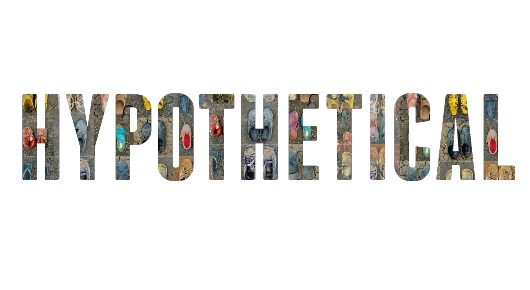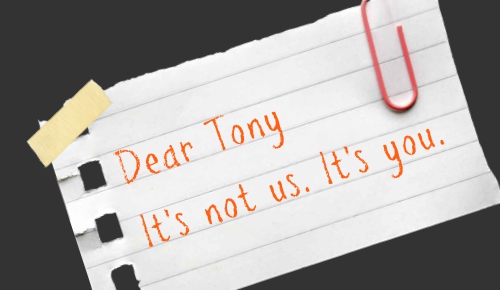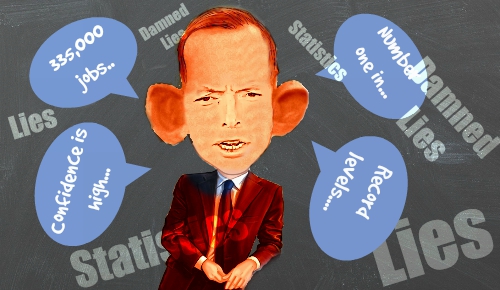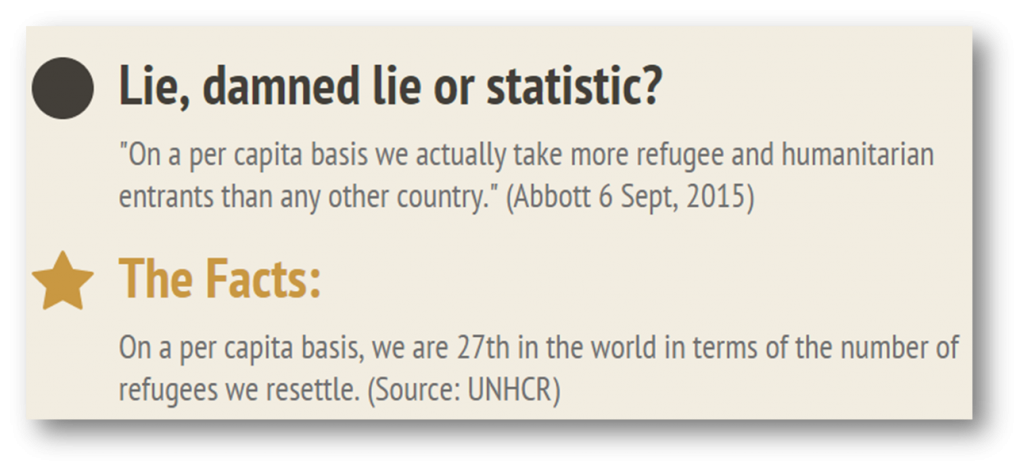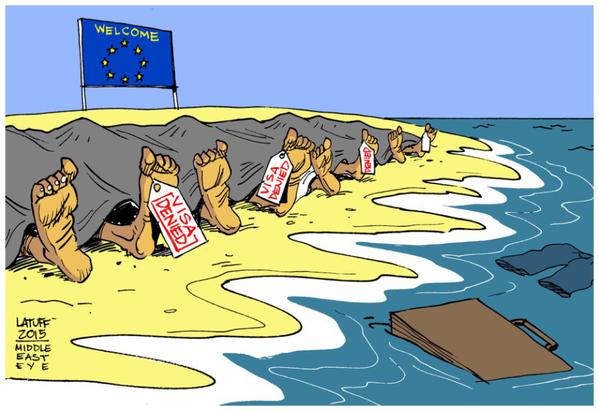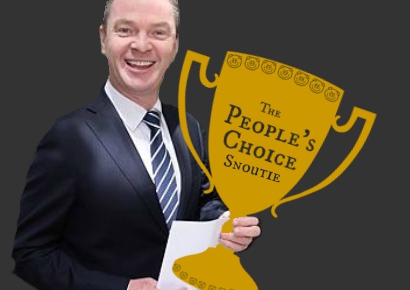Donald Trump: The Fear Whisperer
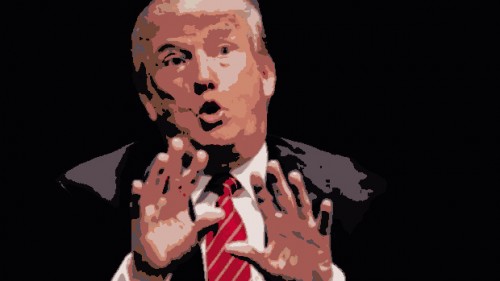
I hate Huntsman Spiders. Correction – I am terrified of them. It doesn’t matter that I know they can’t kill me. They are a HUGE, brown, hairy spider – and when I see one, my heart starts to race, the Adrenalin starts pumping and all I can think of is that it must die. IMMEDIATELY. OK, maybe they aren’t hairy – I wouldn’t actually know. By the time I’ve emptied half a can of fly spray onto one, followed by a frenzy of banging – it’s a little hard to tell.
There’s nothing logical about my fear. I know that. And ironically I’m not scared of all spiders – if I see the relatively small but extremely venomous redback spider, I will calmly and carefully get rid of it.
But that is the nature of an irrational fear or phobia – when it takes over, you’re not thinking, you’re just feeling. And no amount of reasoning is going to convince me that the eight-legged monster of death on my wall is not an immediate threat to life – or at least many limbs.
“What’s that got to do with Donald Trump?” I hear you ask. Good question.
The authoritarian voter and the Huntsman
Research released earlier this week confirmed an aspect of human nature that political scientists have been studying since World War II and which helps to explain one of the key drivers behind Donald Trump’s success with American voters. That research found that there is a high correlation between people identified as ‘authoritarians’ and people who support Trump. In the context of this research, an ‘authoritarian’ is described as being someone who:
- is more fearful than other voters of two particular threats:
- threats from ‘outside’ (such as terrorists and foreigners); and
- the threat of social change (like marriage equality and gun rights);
- wants to ‘impose order’ in the face of a threatening change;
- desires “a strong leader who will defeat those fears with force“.
What jumped out at me from this description is that the type of fear that seems to be driving the authoritarian’s behaviour is very much like the response you would expect from someone with a phobia. And that just like when I see a Huntsman spider, when the authoritarian Trump voter’s fear is triggered, they cannot be reasoned with and demand a swift and overly aggressive response.
“But terrorism actually is deadly” – I hear you say – “and a Huntsman isn’t”.
OK, I’m not entirely convinced that’s true – the bit about the Huntsman not being deadly that is. But let’s go with conventional wisdom for now and assume that a Huntsman is not deadly and instead compare the authoritarian’s reaction with another common phobia – aerophobia, or fear of flying.
One in fifteen people have aerophobia – an irrational fear of flying – and as many as one in four people are ‘nervous flyers’ or ‘phobic’. And yet flying is far less dangerous than driving – by a huge magnitude. The fact is that you are far more likely to be killed in the car on the way to the airport than in the plane you catch from that airport.
However it would be inaccurate to tell an aerophobic that flying is completely safe and that planes never crash. They rarely crash – but very occasionally they do.
The same is true of terrorism. It would be inaccurate to tell an authoritarian Trump supporter that terrorists aren’t dangerous or a threat. But the probability of them being hurt by a terrorist is very low. As I wrote last year, you are far more likely to be killed by falling out of bed than by a terrorist under it. That doesn’t mean we shouldn’t take steps to protect ourselves against terrorists – just as the fact that flying is relatively safe doesn’t mean we shouldn’t take steps to regulate flying to keep it safe.
The issue is that the level of fear that the authoritarian Trump voter feels towards groups like terrorists, Muslims and foreigners – is completely disproportionate to the threat they actually pose, as is the corresponding action those authoritarians want to take. They may or may not have a phobia in the diagnostic sense, but they are definitely ‘phobic’.
And just as I can’t be reasoned with when it comes to the Huntsman spiders – nor can the phobic Trump voter be reasoned with when it comes to their fears – no matter how irrational those fears are. Here’s why…
The physiology of fear
At a physiological level, research shows us that when we feel fear, the amygdala – or the emotional center of the brain – is triggered before we even have conscious awareness of a particular threat. Basically we feel before we think. Unfortunately, when this is combined with stress, the activity in the amygdala (our emotional centre) suppresses activity in the cortex (which is where we generate thoughts and solve problems).
Social psychologist and Professor at NYU Jonathan Haidt has also done a significant amount of research into the authoritarian voter. His research confirmed that:
“… when gut feelings are present, dispassionate reasoning is rare”.
This is why it can seem so difficult to argue with an authoritarian Trump voter about these issues. And why even the likes of commentator John Oliver – who did a brilliant piece recently shooting holes in all the ‘reasons’ Trump supporters give – can’t convince the authoritarian voter not to vote for Trump. When it comes to who they support, authoritarian voters arguably aren’t being driven by reason, they’re being driven by pure unadulterated Huntsman-whacking fear.
Importantly – and I can’t stress this enough – this doesn’t mean the authoritarian voter is never in a rational state of mind, nor that they are stupid – it just means that in regards to this issue, their fear has control of their actions and while not impossible, it is very difficult to reason with them.
Hear the fear
Once you know this, it can help in understanding otherwise seemingly nonsensical comments from authoritarian Trump supporters. If you listen to the words of Trump supporters in the video below from vox.com, you will be able to spot some authoritarian voters. For example, one of the guys interviewed, when asked if it was fair to say that Muslims are ‘the problem’, responded with:
“If you break it down. Yeah. They’re a problem. Sorry to say it. But I can’t help it. I can’t help but feel that way. Right now – I don’t feel safe.” [Emphasisis mine to highlight key words.]
The irony of course, is that while these authoritarian Trump supporters talk tough, underneath it all, when it comes to these issues at least, they are anything but tough. Their show of bravado, their talk of wanting to be tough disguises the fact that they are actually very very afraid. Trying to argue with them will just convince them that you don’t ‘get it’.
And this is where Donald Trump – the Fear Whisperer – comes in….
Donald Trump: The Fear Whisperer
Whether consciously or unconsciously – and I suspect it’s the former – Donald Trump is playing the tune that he knows the authoritarian voter wants to hear. To them – he “gets it”. And like flies to honey, they are drawn to him. Trump does this in two ways:
1. He gives a voice to the authoritarian voter’s fears
The first thing that Donald Trump does to draw in the authoritarian voter is that he gives a voice to their fears. He calls Mexicans ‘rapists’ and ‘criminals’, and says things like “there is a Muslim problem in the world..there is something out there that brings tremendous hatred.”
Trump expresses their fears in a way that authoritarian voters wish they could – but can’t for fear of being condemned if they do. In their words:
“He says what people think when no-one else can. He’s not politically correct.”
(unnamed Trump supporter from the video above)
A theme amongst authoritarian voters seems to be that ‘political correctness’ means they can’t voice their fear – across both sides of the political spectrum.
Certainly, while authoritarian voters are more likely to be Republican (or right-wing) supporters – there are also authoritarian voters who would traditionally be Democrat (or left-wing) voters. And unsurprisingly, at least some of them are Trump supporters – albeit often in secret. The Guardian ran an article this week with quotes from traditional Democrat voters who are secretly Trump supporters. Here’s what a 50-year-old college professor who lives in California had to say about why he would vote for Trump:
“I’m a liberal-left college professor in the social sciences. I’m going to vote for Trump but I won’t tell hardly anybody… I’m also furious at political correctness on campus and in the media. I’m angry at forced diversity and constant, frequently unjustified complaints about racism/sexism/homophobia.”
2. Trump promises to defeat their fears with decisive quick brute force
Having given voice to their fears, Trump then promises a seemingly powerful, swift solution to the authoritarian voter’s fears saying things like:
- “I would bomb the s— out of ’em. I would just bomb those suckers. That’s right. I’d blow up the pipes. … I’d blow up every single inch. There would be nothing left.”
- “And the other thing is with the terrorists, you have to take out their families.”
- [The 11.3 million illegal immigrants] have to go” – “I will build a great, great wall on our southern border, and I will make Mexico pay for that wall.“
This is the authoritarian equivalent of me spraying half a can of fly spray onto a Huntsman spider and then whacking it into oblivion. But Trump’s “simple, powerful, punitive” response – to use the words of political scientist Stanley Feldman – is very attractive to the authoritarian voter. Here’s what one of them; a 48-year-old scientist and self-declared Democrat (left-wing) voter who lives in San Francisco – had to say:
“I voted for Obama. I am a closet Trump supporter and I haven’t told any of my friends or co-workers… I’m very concerned about radical Muslims, and liked Donald’s idea to stop all Muslim immigration. I’m a patriotic socialist, but my strong-borders patriotism wins over my socialism if I have to choose. As Donald says, we either have a country or we don’t.”
Aren’t authoritarian voters just Islamophobes, Homophobes and racists?
Technically, I guess this is true – although not all authoritarian voters will fear the same thing. But when people use the words ‘Islamophobe’ or ‘Homophobe’, even though they have the word ‘phobia’ right in the name, typically we are focusing on them as being descriptors of hatred rather than fear. We speak of ‘hate crimes’ and ‘hate speech’ as being expressions of this.
Now there’s no doubt that Islamophobia, Homophobias and any of the other phobias that come under authoritarianism do result in hatred. Just as an aerophobe’s fear of flying results in them hating flying. But the difference is that the primary emotion behind a phobia isn’t hatred, it’s fear. This is an important distinction.
Don’t get me wrong here – that doesn’t make the hatred right. But it does change the way we should think about how we respond to it. And this is exactly what Trump has done. Listen to the words of one of the Trump supporters from the video again:
“I – I don’t have a racist bone in my body – I’m not that way. I just think we need to vet people a little bit better and find out why they are here and that kind of thing.”
Authoritarians object to being called racists, homophobes, islamophobes etc – exactly because those words are associated with hatred, and the primary emotion they are feeling is fear – or more accurately terror. If you were talking to someone who was afraid of flying, you wouldn’t tell them off for hating aircrafts or call them stupid. Instead, if you were trying to change their behaviour, you would focus on dealing with their fear.
And this is how Trump has become the Fear-Whisperer to authoritarians – he’s made them feel understood. And then he promises them the destructive over-reaction that their fear desires
If Trump were playing ‘fear-whisperer’ to aerophobes, he would be promising them that he would blow up every aircraft on the face of the earth, or alternatively ban all aircraft from entering the United States.
 So what’s the answer then?
So what’s the answer then?
Answers are always much more difficult than questions unfortunately…
In many ways Trump has half the answer – he’s speaking to the authoritarian’s fear rather than at the resulting hatred. That’s definitely a start. The key is to work out how to do that while at the same time promoting a solution to the fear that is constructive rather than destructive and generates less (rather than more) hatred.
I don’t know what the answer to that is. But if I had to throw an idea out there, I suspect it lies in appealing to the authoritarian’s bravery rather than – as Trump has been doing – encouraging a cowardly response. (And there is nothing brave about bombing something into oblivion with drones from the other side of the world.)
If you look at World War II, you could argue that Hitler manipulated the German people with hatred and fear while the many of the allies motivated their citizenry through a call to bravery. In the end, it was obviously the allies that won. There are some that say that Trump’s strategies are inspired by Hitler – that he was a student of Hitler’s speeches. I have no idea if that is true or not – but if it is, we know what won the day back then – bravery and courage. We need leaders who speak to peoples’ fears in these terms to counteract the proliferation of hate that could otherwise ensue.
A final footnote
Now just to be clear, I’m not saying that everyone who votes for Trump is an authoritarian, nor that this is the only reason people vote for Trump. Nor am I saying that everyone who is an authoritarian will vote for Trump – or even vote conservative. Authoritarians are just one subset of voters. But since the research shows that this group is not small and is likely to fluctuate in size based on the perceived threat level – which appears to be growing right now – they are a group large enough to potentially decide the next US election.
There’s also signs of a similar trend here in Australia. Our previous Prime Minister – Tony Abbott – was not above a bit of fear-whispering himself, and given half the chance, I’m sure he’d be all too happy to take that tack again.
This article was first published on ProgressiveConversation.
Like what we do at The AIMN?
You’ll like it even more knowing that your donation will help us to keep up the good fight.
Chuck in a few bucks and see just how far it goes!
Your contribution to help with the running costs of this site will be gratefully accepted.
You can donate through PayPal or credit card via the button below, or donate via bank transfer: BSB: 062500; A/c no: 10495969










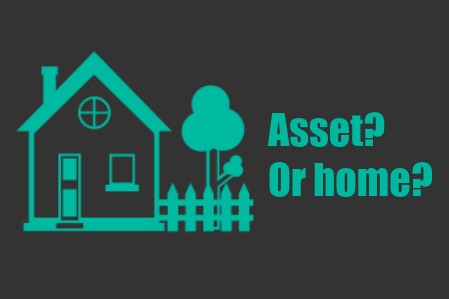
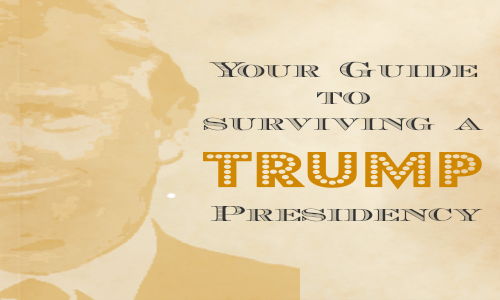

 According to a
According to a 
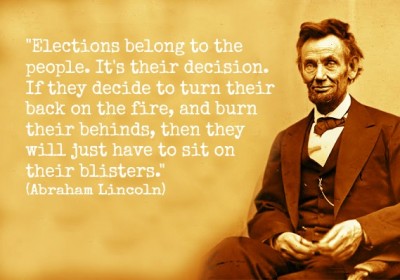
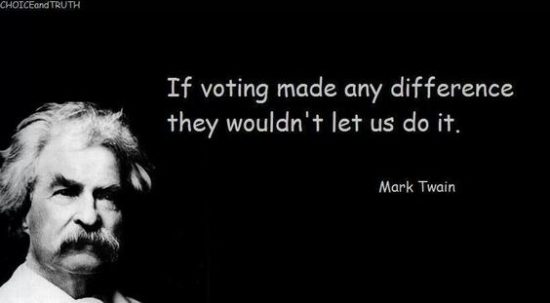

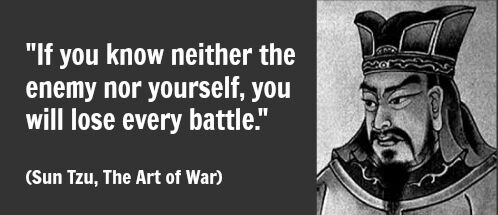
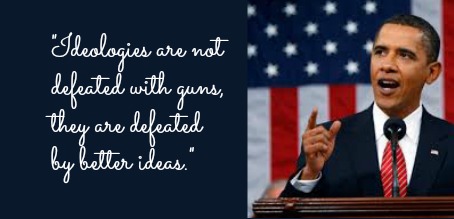
 Suggesting that having stronger physical borders will have any impact on the battle against these horrific terror attacks, is the equivalent of suggesting that you could stop flood waters from overflowing by putting up a sign instructing them not to.
Suggesting that having stronger physical borders will have any impact on the battle against these horrific terror attacks, is the equivalent of suggesting that you could stop flood waters from overflowing by putting up a sign instructing them not to.